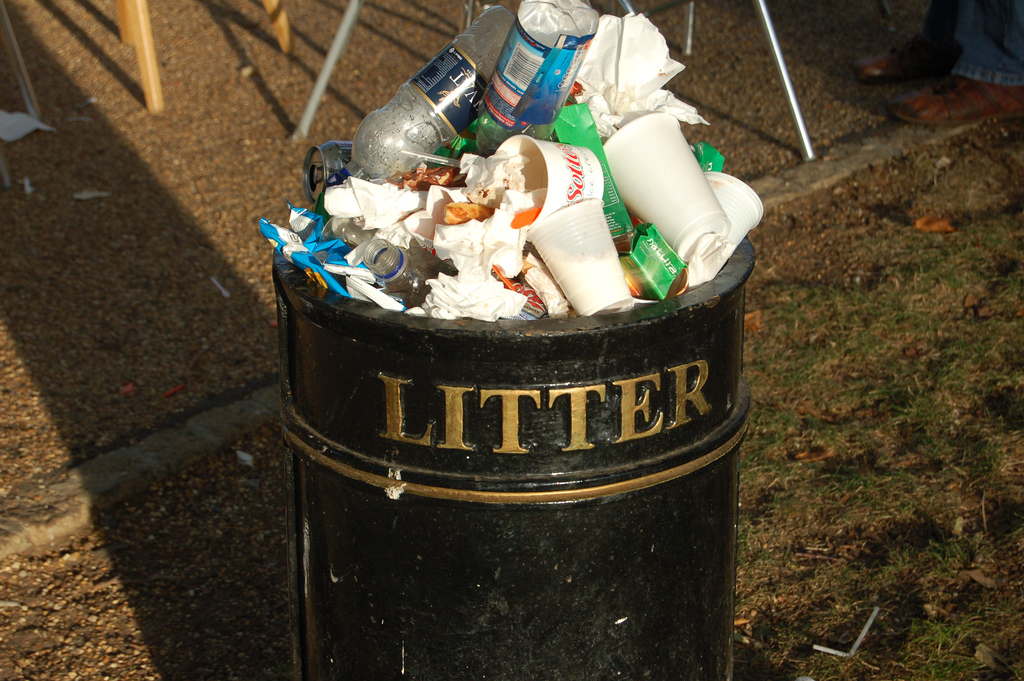
Image by TomGraham via Creative Commons
In 1986, Margaret Thatcher launched a campaign to rid Britain of litter. Returning from a visit to Israel, the prime minister contrasted the spotless streets of Jerusalem with the littered pavements of London. Shortly afterwards, she appointed Richard Branson as Britain’s first ‘litter tsar’, who promised to set thousands of young unemployed people to work cleaning up the streets and clearing derelict sites.
Fast forward three decades, and the House of Commons Communities and Local Government (CLG) Committee has found that litter remains as big and expensive a problem as ever. The cross-party committee estimates that the annual cost of cleaning up litter in England is around £850m, with chewing gum, smoking materials and fast food litter identified as the most frequently littered items.
Describing the problem as ‘endemic’, the Committee’s chairman, Clive Betts MP, said:
“Litter levels have remained largely static over the last 12 years, with councils spending hundreds of millions of pounds of tax-payers’ money fighting a losing battle.”
The Committee’s proposals for tackling the issue include allocating a portion of any increase in tobacco levies to local councils to help pay for the cost of street cleaning, and legislation compelling fast food shops and restaurants to keep their pavements free from rubbish. Although it stopped short of calling for a ‘chewing gum tax’, the Committee warned that the industry:
“…now has one last chance to put its house in order….by making a greater contribution to the cost of clearing gum and staining and by placing larger anti-littering notices on all its packaging, wrappers and adverts.”
Meanwhile, the government insists it is doing what it can to address the problem. In November, the Telegraph reported that ministers were planning a major push to achieve a cultural change towards dropping litter. Echoing Margaret Thatcher’s campaign, the plans were said to include a ‘clean up Britain day’, as well as making it easier for local councils to prosecute drivers throwing rubbish from their vehicles.
Litter can be an emotive issue, and for some the UK government’s proposals don’t go far enough. Giving evidence to the CLG Committee in January, the American writer David Sedaris recommended that litter louts be given heavy on-the-spot fines, noting that:
“In Massachusetts there are now $10,000 fines for littering. It makes people think twice.”
More controversially, Sedaris, who now lives in West Sussex, suggested that poorer consumers were more likely to drop litter than wealthier shoppers:
“I don’t see opera tickets in the street. There’s a Waitrose supermarket near where I live [yet] I found just one Waitrose bag last year. There’s also a Metro Tesco store and I find Tesco bags all the time….”
The writer’s observations sparked a debate on litter as a class issue, and whether Britain could learn from Singapore’s zero tolerance approach.
Although the CLG Committee’s report was confined to England, litter is a blight affecting the rest of the UK. Launching its national litter strategy in 2014, the Scottish Government noted that at least £46 million of public money is spent removing litter and fly-tipping from the environment each year. And earlier this year a survey revealed that there was more litter in Northern Ireland’s streets and parks in 2014 than there has been in a decade.
Meanwhile, back in Israel, the country that Mrs Thatcher once held up as a litter-free model for the UK, things seem to be going downhill. The Tel Aviv daily newspaper Haaretz has observed a growing impression that:
“… almost everywhere in urban areas, and even in open areas. Israel is full of filth, and it looks like the situation is not about to improve anytime soon.”
The paper reported on one campaigner’s efforts to chronicle the problem:
“In one short walk near the Old City walls in Jerusalem, one of the most important tourist sites on earth, he found 641 pieces of trash. The inventory ranged from dog droppings to cigarette butts.”
Tackling litter, it seems, is a worldwide work in progress.
The Idox Information Service can give you access to a wealth of further information on environmental issues. To find out more on how to become a member, contact us.
Further reading
Hidden cost of litter spoiling the environment
How clean is England? The local environmental quality survey of England 2013/14
Share
Related Posts
Supporting residents on the decarbonisation journey: leveraging data for effective retrofit projects
As the drive towards decarbonisation intensifies, the social housing sector’s ability to collect, store and manage vast amounts of data becomes increasingly critical. With a shared goal of creating warmer, carbon-free homes, housing associations’ strategic use of data is essential ....
The recent spikes in energy costs have thrown into sharp focus the challenge of heating our homes. Domestic heating is important, not just for our comfort and wellbeing, but to reduce humidity and prevent condensation. But because traditional heating systems ....
Tackling geographical inequalities is critical for ensuring that all parts of the country have the potential to prosper. When the UK was a member of the European Union, it was entitled to a share of funding from the EU’s structural ....
By Ian Babelon A new-old concept for proximity “Are we there yet?” Parents may patiently nod to their children’s insistent nudges on a 20-minute journey to… somewhere. Quite rightly, researchers have asked: twenty minutes to what? The answer may well ....
